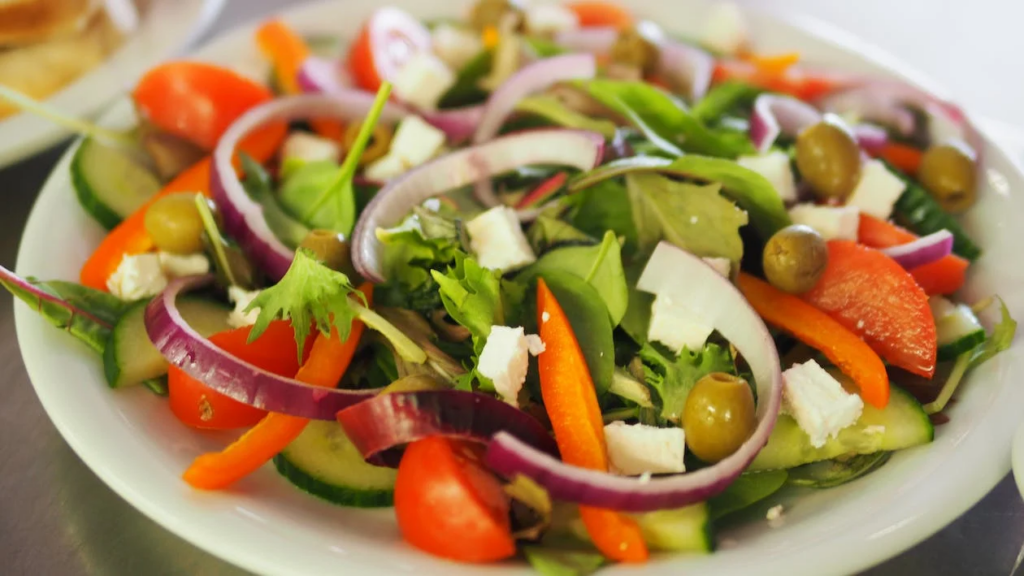Are you looking for a delightful and nourishing way to prioritize your health? Look no outlying than the vibrant and refreshing avenue of a salad diet! Overflowing with essential vitamins, minerals, and antioxidants, salads provide an excellent means to nourish your body and elevate your overall well-being.
Discover the Vibrant Advantages of a Salad Diet for a Healthier You!

Incorporating a Symphony of Flavors:
Incorporating a medley of lively fruits, vegetables, and leafy greens transforms the humble salad into a symphony of flavors that not only tantalize your taste buds but also furnish many health benefits. Whether your preference leans towards the classic garden salad with tomatoes, cucumbers, and carrots or a more adventurous mix of greens, berries, and nuts, there’s a salad to suit every palate.
Low in Calories, High in Nutrients:
Beyond being low in calories and rich in fiber, salads offer a host of advantages. From aiding in weight loss and supporting digestion to lowering the risk of chronic diseases and fortifying immunity, the merits of a salad diet are genuinely extraordinary.

Nutritional Benefits of a Salad Diet:
An abundance of nutrients essential for optimal health is at the heart of a salad diet. Fruits and vegetables come packed with vitamins A, C, and K and minerals like potassium and folate.
Leafy Greens:
Leafy greens, a salad staple, are a nutritional powerhouse. Spinach, kale, and arugula are rich in iron, calcium, and antioxidants.
Colorful Vegetables:
Including a colorful array of vegetables ensures a diverse nutrient profile. Bell peppers provide a generous dose of vitamin C, promoting collagen formation and bolstering the immune system.
Berries for Antioxidants:
Fruits such as berries bring natural sweetness and a wealth of antioxidants. Blueberries, in particular, are known for their brain-boosting properties.

Weight Loss Benefits of a Salad Diet:
A salad-centric approach can be a game-changer for those embarking on a weight loss journey. Salads are naturally low in calories, making them a filling option without the caloric baggage.
Fiber for Satiety:
The high fiber content in vegetables and leafy greens adds bulk to your meals, promoting satiety and reducing overall calorie intake.
Lean Proteins for Fullness:
Including lean proteins such as grilled chicken or tofu in salads provides an additional satiety factor, making them a well-rounded and satisfying option.
Improved Digestion and Gut Health:
A salad diet isn’t just about what you consume; it’s also about how your body processes it. The fiber content in salads plays a pivotal role in promoting healthy digestion.
Microbiota Support:
Moreover, a fiber-rich diet fosters a diverse and thriving gut microbiota. The trillions of microorganisms in your gut play a crucial role in various bodily functions, including digestion, immune function, and mental health.
Enzymes for Digestive Boost:
The enzymes found in raw vegetables also contribute to the breakdown of food, facilitating smoother digestion and nutrient absorption.

Boosted Immune System and Disease Prevention:
The immune-boosting potential of a salad diet cannot be overstated. Fruits and vegetables contain vitamins and antioxidants that fortify the immune system.
Vitamin C for Immunity:
Vitamin C, abundant in citrus fruits and leafy greens, is renowned for its immune-enhancing properties.
Antioxidants for Disease Prevention:
The antioxidants present in berries, tomatoes, and other colorful vegetables combat oxidative stress and inflammation, which are linked to the development of chronic diseases.
Increased Energy and Improved Mood:
The vibrant nutrients in salads not only contribute to physical health but also play a crucial role in mental well-being.
Mood-Stabilizing Omega-3s:
The omega-3 fatty acids in certain salad ingredients, like walnuts and flaxseeds, further contribute to brain health and may have mood-stabilizing effects.
Steady Energy Release:
Moreover, the steady release of energy from the complex carbohydrates in vegetables provides a sustained fuel source for your body.

## Tips for Creating a Delicious and Satisfying Salad:
Creating a delectable salad is an art that combines flavors, textures, and nutritional diversity.
Mix and Match:
Combine colorful vegetables, fruits, and leafy greens to create a visually appealing and nutrient-rich base.
Add Protein:
Incorporate lean proteins such as grilled chicken, shrimp, tofu, or beans to make your salad more satiating and balanced.
Include Healthy Fats:
Add sources of healthy fats, such as avocados, nuts, or olive oil, to enhance flavor and promote nutrient absorption.
Experiment with Dressings:
Create your dressings using olive oil, vinegar, and herbs to control added sugars and unhealthy fats. Experiment with flavors to find your favorite combinations.
Go Whole Grain:
Include whole grains like quinoa or farro for added fiber and a satisfying texture.
Be Mindful of Portion Sizes:
While salads are generally low in calories, be mindful of portion sizes, especially if adding calorie-dense ingredients like nuts or cheese.
Embrace Seasonal Ingredients:
Use seasonal produce to ensure freshness and variety in your salads. This also supports local agriculture and provides a diverse yearly nutrient intake.
## Incorporating Variety and Color into Your Salad Diet:
The key to a successful and sustainable salad diet lies in diversity. Embrace a rainbow of colors in your salads, as different hues often indicate varied nutrient profiles.
Explore Different Greens:
Instead of sticking to one type of lettuce, experiment with a mix of spinach, kale, arugula, and other leafy greens to diversify the nutrient content.
Play with Texture:
Include a variety of crunchy, chewy, and crisp textures by adding ingredients like nuts, seeds, croutons, or even pomegranate seeds.
Seasonal Rotation:
Rotate your salad ingredients based on seasonal availability. This keeps things exciting and ensures a broader range of nutrients.
Incorporate Root Vegetables:
Roasted sweet potatoes, beets, or carrots can add color and earthy flavors to your salads.
Mix Fruits and Vegetables:
Combine the sweetness of fruits like strawberries or mandarin oranges with the savory notes of vegetables for a well-balanced and flavorful salad.
## Potential Challenges and How to Overcome Them:
While a salad diet is undoubtedly beneficial, some challenges may arise. Here’s how to overcome them:
Boredom:
Eating the same salad every day can lead to monotony. Keep things exciting by rotating your ingredients and trying new recipes.
Satiation:
Ensure your salads include an adequate balance of protein, healthy fats, and carbohydrates to satisfy you.
Time Constraints:
Preparing a salad may seem time-consuming, but prepping ingredients in advance or opting for quick recipes can save time.
Seasonal Availability:
In some regions, certain ingredients may not be available year-round. Adapt your salads to include seasonal produce to overcome this challenge.
Social Situations:
Finding a salad that suits your preferences might be challenging when dining out or attending social events. Look for customizable menu options or plan by bringing a homemade salad.

Conclusion: Embracing a Salad Diet for a Healthier Lifestyle:
In conclusion, the benefits of a salad diet extend far beyond mere nutrition. It’s a lifestyle choice that promotes overall health, well-being, and culinary enjoyment. Salads offer a holistic approach to nourishing your body, from weight management and improved digestion to a strengthened immune system and enhanced mood.
You can seamlessly integrate a salad diet into your daily routine by incorporating diverse, colorful ingredients, experimenting with flavors, and overcoming potential challenges. The journey toward a healthier lifestyle begins with the simple yet powerful act of embracing salads as a staple in your diet.
So, why wait? Let salads’ vibrant colors and rich flavors transform your health and elevate your well-being. Fuel your body with the goodness of nature, one colorful bite at a time!
Frequently Asked Questions
-
What makes a salad diet beneficial for health?
A salad diet is rich in vitamins, minerals, and antioxidants, promoting overall health, aiding weight loss, and boosting immune function.
-
How can salads support weight loss efforts?
Salads are low in calories, high in fiber, and provide a feeling of fullness, contributing to weight management and reducing unnecessary snacking.
-
What role do salads play in digestion and gut health?
The fiber in salads promotes healthy digestion, while raw vegetables contribute enzymes and prebiotics, fostering a diverse and thriving gut microbiota.
-
Can a salad diet help prevent chronic diseases?
The antioxidants in fruits and vegetables combat oxidative stress, reducing the risk of chronic diseases like heart disease, diabetes, and certain cancers.
-
How do salads contribute to increased energy and improved mood?
Nutrient-rich salads, including omega-3 fatty acids, support brain health, providing sustained energy and potentially stabilizing mood.
-
What are some tips for creating a satisfying salad?
Mix and match colorful ingredients, add proteins and healthy fats, experiment with dressings, and embrace seasonal variety for a delicious and satisfying salad.
-
How can one overcome challenges like salad boredom?
Overcome boredom by rotating ingredients, trying new recipes, and embracing diverse textures and flavors to keep salads exciting.
-
Can salads be adapted to different dietary preferences?
Absolutely! Salads are versatile and can be customized to suit various dietary preferences, including vegetarian, vegan, or gluten-free options.
-
Is it possible to maintain a salad diet in social situations?
Yes, look for customizable salad options when dining out, or plan by bringing a homemade salad to social events to meet your dietary preferences.
-
How can one ensure salads are convenient for a busy lifestyle?
Prepare salad ingredients in advance, opt for quick recipes, and incorporate time-saving strategies to make salads a convenient and nutritious choice.










[…] Explore the efficacy of salad diets for weight loss over a three-week period. Dive into the science behind calorie deficits, the benefits of nutrient-rich salads, and factors influencing individual results. […]
[…] Discover the benefits of a salad diet – boost health, aid weight loss, and elevate well-being with nutrient-packed bowls for a vibrant an […]